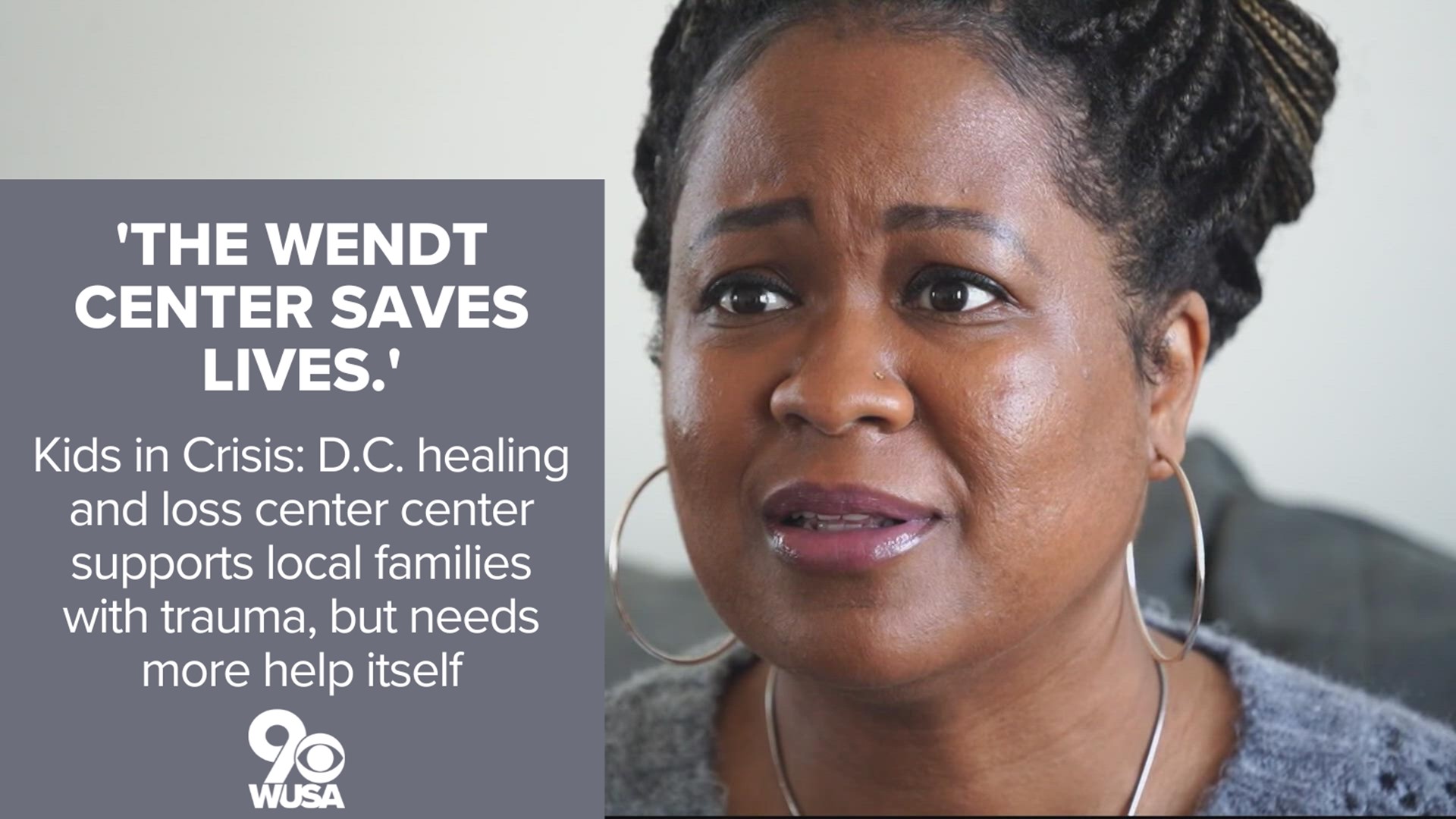WASHINGTON — It's been a battle to smile again from the inside for Qiana Wright. Her infant daughter and brother were killed within two years of each other.
“I smile because they’re smiling in the pictures, but my heart breaks," she said.
Her 9-month-old daughter, Savannah, was killed in 2015 through alleged child neglect at daycare.
Two years later, her brother, Brian was shot to death after a workplace dispute in D.C.
"My heart breaks every time I walk past this, but they’re smiling at me, and I’m smiling right back at them," Wright said, gesturing toward a memorial she created for the two in her living room. “Just with me sitting, talking to you now shows that progress was made.”
Her three other kids weren't quite ready to talk, but they have been opening up to the Wendt Center for Healing and Loss in DC.
The executive director of the group says they help people heal from life's worst moments.
“The walls of this center are full of heartbreaking stories from kids who have been exposed to and experience things that just, you can't imagine that kids get exposed to and experience," Executive Director, Michelle Palmer said. "And it is almost always related to gun violence.”
Palmer said they give kids tools to address that trauma.
“There's a lot of conversation now about this false narrative that somebody is either a perpetrator or a victim, that there's an either or, when the reality is that most oftentimes, they are both," she said. "So many people are just going around the world, thinking that they don't matter. And I think that when you think you don't matter, it becomes really easy to think that other people don't matter.”
Palmer said the biggest resource the DMV needs more of is therapists.
"We need clinicians who are trauma trained in the modalities that we know help kids heal from trauma," she said "And that is hard. Getting trained on those is super expensive, and it's very time intensive.”
Palmer said the wait to see one of their clinicians can be up to 12 months.
So, the center started its own training institute last year to increase the capacity of therapists, school staff, and others on helping kids handle trauma.
“Because when you are in pain, to be told that you have to wait to heal is just, it's intolerable," she said.
Palmer said the most important thing the city can do to better support providers like the Wendt Center is to fund them.
For the past few years, Palmer said the money agencies like theirs get from DC's Office of Victim Services and Justice Grants has stayed the same.
“Usually an agency can absorb a year-ish, maybe two of flat funding if inflation stays fairly steady, but it hasn’t, and so we are facing an absolute crisis in the victim service provider community," Palmer said.
The director of OVSJG told WUSA 9 that could happen to providers for a number of reasons: some of the money they receive has to go to specific initiatives; the office has been working to diversify who they award grants to, so more groups are receiving money; money they get from the federal government has decreased in recent years; and they focus on victims of crime, specifically.
The Wendt Center works with families suffering from death and loss in any capacity.
“We see less people because we can’t afford to, and so there’s a lot of really I think worrisome implications," Palmer said.
The director of OVSJG said, "We recognize the challenges that providers are having, which is why the mayor has made specific investments in the FY23 budget for victims services in general as well as increased funding for sexual assault services, services for victims of gun violence, additional funding for victims of domestic violence as well. And we anticipate that we'll be able to respond to the needs of providers."
She also said the council is planning to make additional investments up to $11 million as well in the OVSJG budget.
Still, Palmer said many groups like theirs need more funding, and without it, families like the Wrights may not be able to get help.
“To be able to give free resources to families is really important," Qiana Wright said. "Who can think about money if your world has just been rocked by some type of grief or trauma?"
She said the center has impacted her entire family's lives.
“The Wendt center...," she paused, "saves lives."
The center also runs what's called Camp Forget-Me-Not for kids who have had a close relative die.
In the summer of 2021, Palmer said the number one cause of death for those relatives among the younger campers was a homicide. She said that's the first time that's happened in years.

